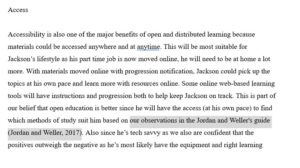Hey Folks
Part 1 Evidence and Reflection of my Learning:
Option A: structured by Outcome
I really enjoyed EDCI 339. Even though it was an elective, I found some correlation to my undergraduate studies of computer science. The connection with the course to my studies was very insightful and helpful.
For example, In topic 2 I discussed Major’s Teaching Online. As mentioned previously in my blog I talked about how Major introduced the 5 organizational elements: enrollment, amount, timing, platform, and pathway (Major, 2015). I have a friend right now who I’m helping that is teaching younger students (late elementary to junior high) to understand beginner computer concepts. Concepts that I have personally studied in csc 110 and 115 here at uvic. Through the way he setup the course online, I mentioned to him how his strategy in terms of online distribution and platform was going to benefit his students with studying computer science. Through his easily documented and basic step by step instructions he offers students both the freedom yet resources to attempt on their own yet is also to seek help if unable to progress. Especially by playing videos in a specific format where he has created examples that are short and to the point. Thus offering a quality service that’ll be better than in person as the student can play at any time and at any rate due to their learning style. I also told him based on my memory of my blog post about how timing is the most important point of any course. I believe that a course should be able to deliver all its material in an organized and timely manner such that each topic is given enough attention. Specifically based on my poor experiences with online courses as written in my blog post for topic 2. My friend agreed and instead designed the course to be as simplistic as can be and try to offer more layman descriptions. By assisting my friend I’ve managed to use the learning critique I’ve acquired from reading EDCI material. Therefore I believe I have a better perspective and guidance as my understanding on better course service will allow students to get the most benefit out of my friend’s online teaching course. Specifically now they have a much longer window and time to understand as the course is year long as opposed to me being taught a semester of new material. Therefore I’m confident that through my reflection and study of Moore’s reading I’m capable of offering help to my friend’s first time teaching a computer science course.
Also this confidence was reflected within my group work in Assignment 2 with pod 6. We specifically managed to work as a team and I believe I managed to pull off my work through the learning I mentioned earlier. By reading the persona of Jackson I better attempted to learn about someone’s condition before assessing what I can do to help. In terms of assignment 2 this meant closed education would provide him the best means of success. Especially when I had to provide commonly agreed upon evidence found in the sources of our course. I found it really sharpened my argument skills as I had to provide evidence to my suggestion in the proposal that directly reflected what we were taught in EDCI 339. Specifically for example the part where I wrote about my observations in the Jordan and Weller’s guide and what study style suited him based on that (Jordan and Weller, 2017). In general I also liked commenting on my group’s members as well as receiving comments as I believe it helped reshape my views on topic 2. To which later I’ll be updating. My team kept up to date and we communicated mildly well in discord which helped me strengthen my team building skills as I look forward to using what I learnt here on further group projects in my career as a computer scientist. Especially on what I could’ve done to handle certain situations and provide a better outcome where everyone is more satisfied next time.
Another interesting reflection about topic 1 is my blog post about my aha moment. Specifically the part when I was reading the acceptable use policies done by uvic. I still have that sense of worry when I participate in using Zoom and brightspace to further my education as I’m now more critical from my readings of FIPPA in EDCI 339 about how well Uvic was handling my information based on my original ignorance of the situation. Most directly on the fact Uvic aka making accounts that use my information on other web databases and thus harvesting my info to other companies. I’ve actually developed the interest in studying computer networks and have gone to the lengths of using VPN’s in order to better hide my identity through my ip address. Also, the same service offers a password manager to which changed my mind on blog post 1 about unnecessary passwords as I have faith in this password manager to give me credible passwords that it’ll remember for me with secure ease. Again this was all due to my critical thinking on readings done in EDCI 339.
In terms of future research I believe my studies and knowledge in Artificial intelligence will be my next stepping stone in terms of where I want to further my learning from this course. I believe from topic 3 about Kral and Schwab’s article and the inspitations of ideas from the example uploading content to youtube in the Indigenous learning spaces article (Kral and Schwab, 2012). I also believe open education can provide different means of educational understanding. It crucial I find ways to implement certain artifacts in my field and find ways to better provide a service to those who felt originally left out of Canadian culture and history. However, with power comes responsibility as I believe I must educate myself further on certain minority and diverse groups backgrounds if I’m gonna make services that benefit society for the greater good. From my reflections on Wiley & Hilton Open Educational Resource (2018) it gave me some really good ideas on how to use technology to teach clients or employers about certain ideas. Specifically the point about does the new artifact have value beyond supporting the learning of its author? Since I must communicate why certain ideas are important to consider overall. If I’m gonna sway public opinion and consumerism within my field of business of computer science for the better and progress into a better society.
Part 2: showcase blog of topic 2 discussion
Showcase blog: https://olliefromcanada.opened.ca/showcase-blogpost-2/
Original blog: https://olliefromcanada.opened.ca/topic-2-discussion-2-by-os/
What I changed:
I talked about my development with the topic readings and how it correlated to helping my friend with his online course. I also reflected on how it impacted me the most as I was able to recall alot of information and use my personal experience to add a more in depth conversation that will move into action when my friend implements my suggestions. I also commented on Zhao and Ryan’s post as I believe those guys provided some good insight into my post that I wanted to discuss. Specifically Ryan’s answers as it helped me reflect more on topic 2’s discussion on top of the readings.
Photo evidence



References
Acceptable Use Policies (University of Victoria)
FIPPA legislation in British Columbia
Jordan, K. & Weller, M. (2017). Openness and Education: A beginners’ guide. Global OER Graduate Network.
Major, C. H. (2015). Teaching Online – A Guide to Theory, Research, and Practice. Retrieved from http://ebookcentral.proquest.com/lib/uvic/detail.action?docID=3318874 (pp. 76-108)